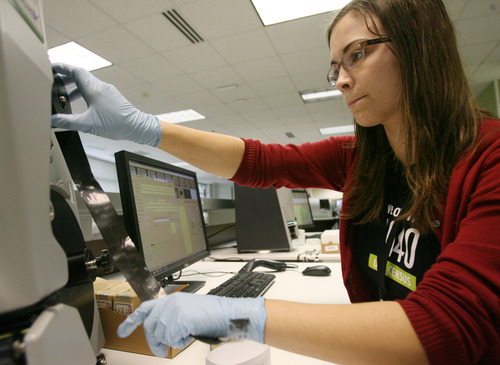This is an archived article that was published on sltrib.com in 2013, and information in the article may be outdated. It is provided only for personal research purposes and may not be reprinted.
Two of the world's largest family history research organizations are joining forces in an effort they say will bring 1 billion historical records online.
The LDS Church-operated FamilySearch International and the Utah-based company Ancestry.com announced a deal Thursday in which they will collaborate to bring online the church's vast worldwide collections of family-history records.
Ancestry.com CEO Tim Sullivan said while details need to be worked out, his company planned to pour more than $60 million into the effort over the next five years.
"To have the two, I guess one could say, largest and most important organizations in the family history space working together to bring over a billion records online over the next several years is just a fantastic thing," he said.
FamilySearch calls itself the largest genealogy organization in the world. It is an arm of The Church of Jesus Christ of Latter-day Saints, the Salt Lake City-based church whose beliefs are centered around extended families joined together through ceremonies in its temples.
Ancestry.com of Provo says it is the "world's largest online family history resource," with about 2.7 million paying subscribers who have access to online records and connections to other family researchers.
Don Anderson, FamilySearch senior vice president of patron and partner services, said his organization sees the agreement as further expanding its historic mission of providing access to family history research material.
"I think from a FamilySearch perspective, what we're trying to do is work with a variety of partners where we can make the records the most accessible to individuals to use them," he said. "This relationship with Ancestry is really indicative of work we're trying to do across the board."
The effort of the two organizations will be directed at taking LDS-gathered records from around the world, now mostly in microfilm, and converting them into digital form that is searchable online.
For Ancestry.com, which operates mostly in English-speaking countries as well as Sweden, the deal will provide it records from many other countries and enable it to expand its reach, said Sullivan.
"We're really excited about the chance to potentially open up new businesses in new international markets but as important give Americans access to records from some of the nations of their homelands," he said.
The effort joins together the nonprofit FamilySearch, which provides access to its records for free, and the for-profit Ancestry.com, which charges subscribers monthly fees for access to its databases and services.
The two organizations have collaborated on projects for several years and Sullivan said Ancestry.com does not view FamilySearch's free content as a drain on its revenues.
"If anything it's a great way to let people try out the category with a free site," he said, while Ancestry offers other content as well as access to a large online community and unique technology.
Twitter: @TomHarveySltrib



